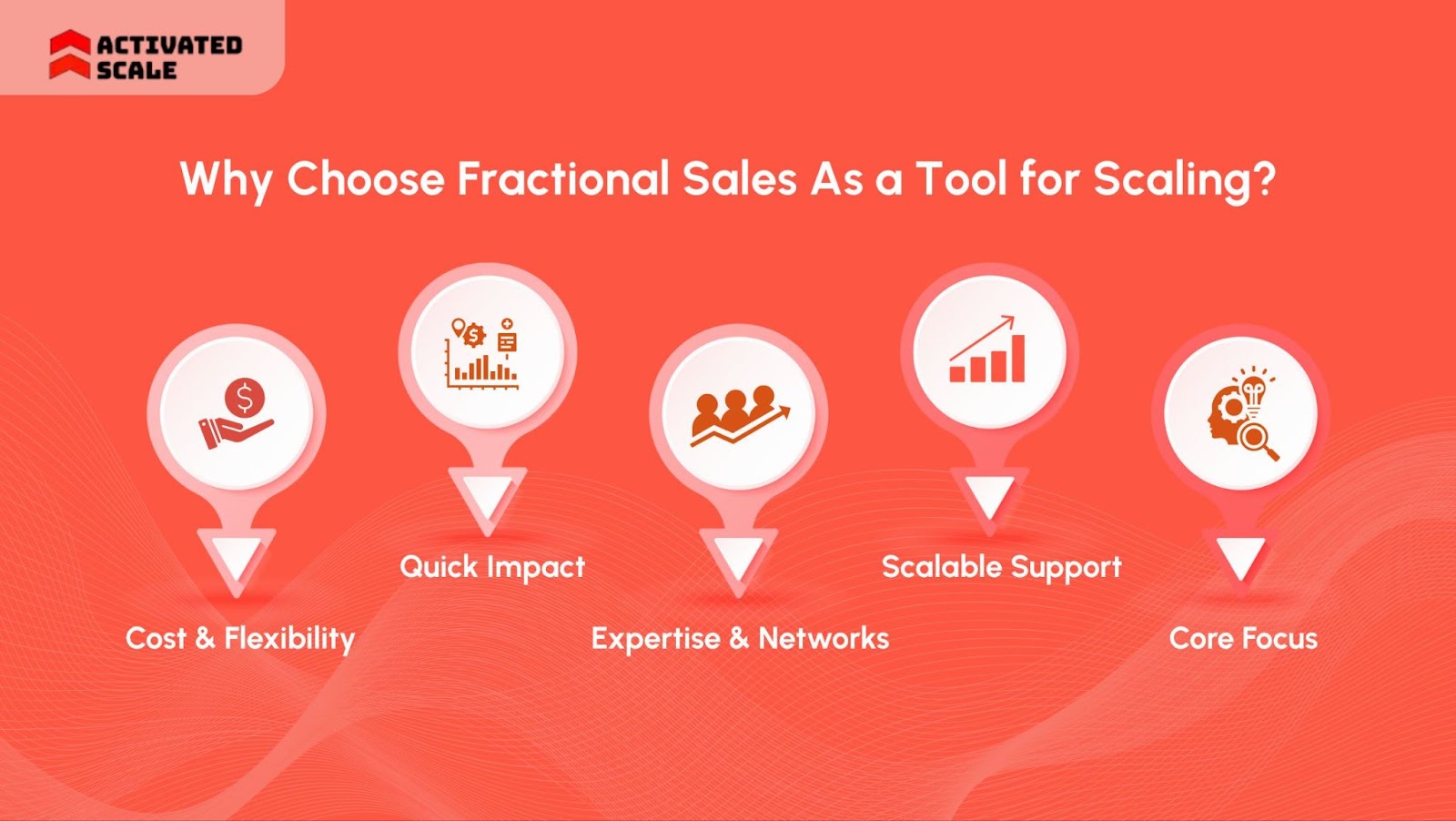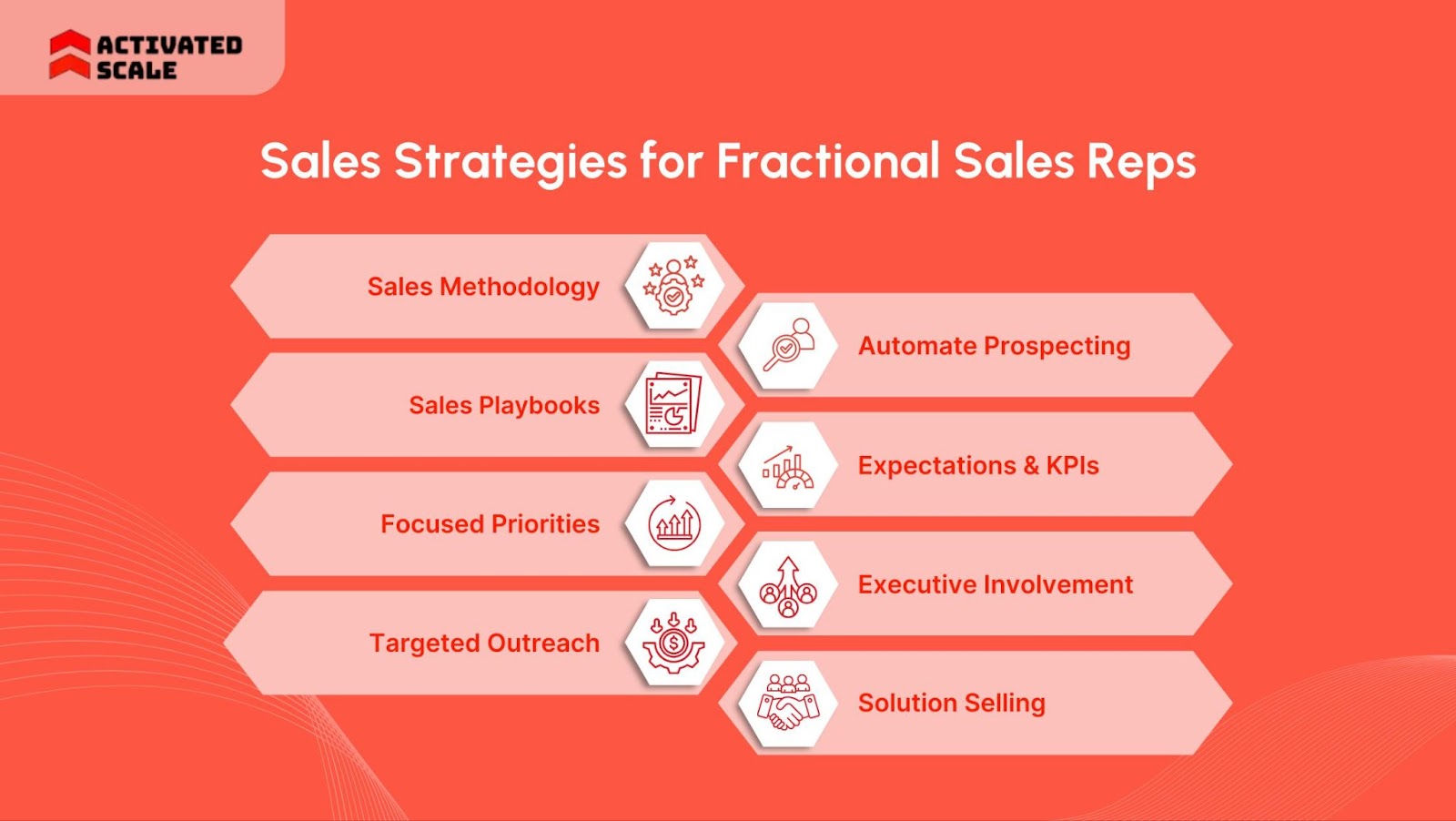Scaling your sales team doesn’t always have to mean ballooning costs or lengthy hiring cycles.
By 2025, 80% of B2B interactions are expected to occur online, and agile companies are turning to fractional sales teams to stay ahead.
According to a study by Sales Xceleration, companies that engaged fractional sales leaders reported an average revenue increase of 32% within the first year of engagement.
This flexible model connects businesses with seasoned sales leaders and often with 15+ years’ experience without the commitment of a full-time hire. The result? Rapid access to expertise, improved pipeline performance, and cost savings that fuel sustainable growth.
If you’re looking to scale smarter and faster, discover how fractional sales teams are redefining what’s possible for ambitious businesses.
Key Summary (TL;DR)
- Flexible, Cost-Effective Expertise: Fractional sales teams provide part-time support tailored to business needs, without full-time costs.
- Quick Onboarding and Scalable Support: They offer rapid integration and flexible sales support that adapts to market changes.
- Proven Strategies for Measurable Results: Using structured methods, automation, and custom playbooks, fractional teams drive consistent outcomes.
- Perfect for Startups and SMBs: Ideal for companies expanding into new markets, they accelerate revenue while letting businesses focus on core priorities.
What Are Fractional Sales Teams?
A fractional sales team refers to a flexible, on-demand group of sales professionals that businesses can hire for a limited time or on a part-time basis to fulfill specific sales goals, often without the commitment or overhead associated with traditional in-house teams.
These teams are typically made up of experienced sales leaders, managers, and representatives who can be quickly integrated into the business to help scale operations, close deals, and drive revenue.
Comparison with Traditional Sales Teams
The following table outlines the key differences between fractional sales teams and traditional sales teams:
Also Read: Building a Successful BDR Team: Roles, Strategies, and Impact
Why Choose Fractional Sales As a Tool for Scaling?

A startup looking to minimize costs or an established company seeking to scale rapidly can both benefit from fractional sales teams, which provide the agility and expertise needed to achieve sales goals.
1. Cost Savings and Budget Flexibility
Fractional sales teams allow businesses to access high-level sales expertise without committing to the significant costs of hiring full-time, salaried employees.
Rather than incurring salaries, benefits, and long-term employment expenses, companies can pay for only the hours worked or the specific sales objectives met, making it a highly efficient and cost-effective solution.
- Cost savings: Fractional sales teams are typically paid based on deliverables, which can be more economical than hiring a full-time employee with a fixed salary.
- Budget flexibility: Businesses can allocate resources more effectively by scaling up or down according to sales cycles or project needs.
2. Fast Onboarding and Immediate Impact
One of the key advantages of fractional sales teams is their ability to hit the ground running. Unlike traditional employees who may require extensive onboarding, fractional sales teams bring immediate value.
With their experience and expertise, they are ready to contribute right away, often with little to no ramp-up time.
- Quick impact: With seasoned professionals already trained and experienced, fractional teams can quickly integrate into your business, minimizing delays.
- Short-term focus: They are often brought in for specific sales objectives, enabling a laser-focused impact without distractions from other responsibilities.
3. Access to Specialized Expertise and Networks
Fractional sales professionals often come with years of experience in specific industries or niches. This expertise can be a major asset for businesses seeking specialized knowledge or trying to break into new markets.
Be it B2B sales, enterprise-level deals, or specific industry knowledge, fractional teams bring the deep, targeted expertise that traditional teams may lack.
- Industry-specific knowledge: Fractional teams often have prior experience working with businesses in similar industries or verticals, providing valuable insights.
- Networks and connections: These professionals come with a network of contacts and relationships that can be leveraged to open new doors for business development.
4. Flexibility to Scale Up or Down
A major advantage of fractional sales teams is their scalability. Businesses can increase or decrease their sales resources based on immediate needs, such as seasonal demands or expansion into new markets. This flexibility allows companies to stay lean while having the necessary support to meet their sales targets.
- Scalable growth: Fractional teams can be quickly adjusted to match the pace of business growth, allowing for smooth transitions during periods of high demand or market shifts.
- Adaptability: Whether a business is entering a new market or testing a product, fractional teams can be brought in for temporary support and phased out once the goal is achieved.
5. Focus on Core Business Activities
When businesses outsource sales efforts to fractional teams, they can free up time and resources to focus on their core operations.
This is particularly important for small businesses and startups, where leadership may be spread thin and needs to prioritize other aspects of business growth, such as product development, customer service, or strategy.
- Delegate with confidence: Fractional sales teams bring the expertise necessary to handle a key component of business growth while the company’s leadership focuses on strategic priorities.
- Operational efficiency: With external experts managing sales, internal teams can direct their energy towards enhancing other functions of the business.
When Are Fractional Sales Teams Most Beneficial?
Fractional sales teams can be particularly effective for businesses at various stages of growth or those with specific needs:
- Startups and Small Businesses: Startups with limited budgets can leverage fractional sales teams to access expert sales support without the expense of hiring a full-time team.
- Companies Facing Rapid Growth: Businesses experiencing rapid scaling may require temporary sales support to meet increasing demand while they hire and onboard permanent staff.
- Enterprises Testing New Markets: Larger companies entering new regions or verticals can utilize fractional sales teams to gain local insights and implement strategies without committing to a permanent team upfront.
- Businesses in Need of Sales Turnarounds: Companies looking for a fresh perspective or guidance to turn around underperforming sales teams can benefit from the expertise of fractional sales professionals to drive immediate results.
- Project-Based Sales: Businesses launching new products or marketing campaigns that require a temporary increase in sales efforts can rely on fractional teams to manage the spike in activity efficiently.
Discover how Activated Scale connects you with top-tier fractional sales professionals who deliver results on demand. Take the next step toward agile, cost-effective growth, learn more about fractional selling with Activated Scale today.
Sales Strategies for Fractional Sales Reps

Fractional sales reps operate in dynamic environments, often juggling multiple clients and industries. To maximize their impact and deliver consistent results, they rely on a set of proven, adaptable strategies tailored to the unique needs of each business.
1. Implement a Structured Sales Methodology
Fractional sales reps thrive when they follow a comprehensive, repeatable sales framework, such as Challenger Sale, Sandler, or SPIN Selling, adapted to the client’s market and goals.
This ensures consistency across all sales activities and enables scalable, repeatable success as the business grows.
2. Automate Outbound Lead Generation
Efficiency is critical for fractional reps. Using tools like Apollo, Outreach, or LinkedIn Sales Navigator allows them to automate prospecting, nurture leads with targeted sequences, and maintain a steady pipeline.
This approach frees up time for high-value tasks like discovery calls and closing deals, which is especially important for early-stage or resource-constrained companies.
3. Develop Customized Sales Playbooks and Assets
Creating customized playbooks and “sales cookbooks” detailing ideal customer profiles, value propositions, objection handling, and closing techniques. This empowers fractional reps to deliver consistent messaging and results.
These assets also serve as valuable resources for internal teams, ensuring knowledge transfer and continuity when fractional engagements end.
4. Set Clear Expectations and KPIs
Businesses should document sales processes, define responsibilities, and establish key performance indicators (KPIs) before onboarding a fractional rep. This alignment ensures accountability and measurable progress from day one.
5. Start with Focused Priorities
Fractional reps are most effective when initially assigned to core sales activities such as lead generation, qualification, or prospecting.
Once they’re integrated, their role can expand to include more complex tasks, maximizing their expertise without overwhelming them.
6. Use Founder or Executive Authority
In startups or small businesses, having the founder or an executive involved in initial sales conversations can set the standard and build credibility. Fractional reps can then take over with a clear understanding of the company’s voice and approach.
7. Consistent Outreach and Persistence
Regular, targeted outreach and persistent follow-up are essential. Fractional reps should maintain a disciplined cadence of communication to build relationships and move prospects through the funnel.
8. Present Solutions, Not Just Pitches
Fractional sales reps are most successful when they focus on solving client problems rather than delivering generic sales pitches. Solution-oriented conversations build trust and demonstrate value, which is especially important when working across multiple industries or verticals.
Also Read: Mastering CRM Sales Pipeline Stages: A Comprehensive Guide for Success
Conclusion
Scaling your business doesn’t have to be a leap of faith. By adopting fractional sales teams, you’re opening the door to senior-level expertise, agility, and measurable growth without the traditional constraints.
Ready to see how fractional sales can transform your growth strategy?
Explore how Activated Scale connects you with vetted, experienced fractional sales professionals and leadership. This allows you to experiment boldly and let your sales ambitions scale as dynamically as your business deserves. Discover more about fractional selling or fractional sales leadership with Activated Scale today.
FAQs
1. How are fractional sales reps typically compensated?
Fractional sales reps are usually paid through a mix of base retainer and performance-based incentives. If a company has a proven, repeatable sales model, a 50/50 split between base and commission is common. For newer offerings requiring more groundwork, a higher base or even a non-commissioned retainer may be more appropriate.
2. Can fractional sales reps work for multiple companies at the same time?
Yes, most fractional sales reps manage several clients simultaneously. This flexibility allows them to offer specialized expertise to multiple businesses, but it also means clear communication and defined deliverables are essential for success.
3. What are the most common billing models for fractional work?
The most common billing models for fractional professionals are monthly retainers, project-based fees, and hourly rates. About 40% use a monthly retainer, another 40% use a mix of retainers and hourly billing, while the rest rely on purely hourly or alternative structures. This flexibility allows businesses to tailor engagements to their needs and budget.
4. What are the risks of hiring a fractional sales rep?
Potential risks include misalignment with company culture, lack of long-term commitment, and inconsistent results if expectations are not clearly set. Choosing experienced, well-vetted fractional reps and defining clear KPIs can help mitigate these risks.
5. Which industries most commonly hire fractional sales reps?
Industries that frequently hire fractional sales reps include technology, SaaS, professional services, manufacturing, and B2B services. These sectors value the ability to scale sales efforts quickly and access senior talent without long-term commitments.
The Ultimate Guide to Hiring a Salesperson!
Get the step-by-step guide to hiring, onboarding, and ensuring success!
_edi.png)




